|
|
Blog Roll Continued: Previous
< 4 > Next
<Home> < 8 > <
7 > < 6 > <
5
>
< 4 >
< 3 > <
2 > <
1 >
| |
|
CCARE - Compassion & Business
Conference
April 27, 2013 |
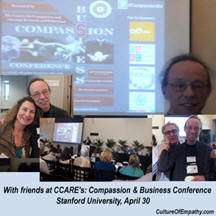 |
|
I went to the
Compassion & Business Conference yesterday at Stanford University
and had a lot of fun meeting up with people I had only known
online. Fun to meet them in the flesh and be able to give them a
big hug. I was also giving out my 'FREE EMPATHY' cards.
The
conference was hosted by the Center for Compassion and Altruism
Research and Education (CCARE). It was an important topic -
how to bring more compassion into the business world. Lot's of
presenters from science, education and business, etc. offering
talks, panels and some hands on workshops. I would have liked more
hands-on time since the academic part is so readily available
online now-a-days... what's so precious is the time to get
together with people in deeper personal dialogs. I would love to
do some empathy circles in a setting like this.
The Center
for Building a Culture of Empathy was a sponsor of the event. Was
great to see our logo up on the screen.. I had to take a picture
of that. ;-) |
|
|
|
|
|
How to Build a Culture of Empathy In Medicine
Raúl de Velasco |
|
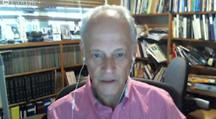
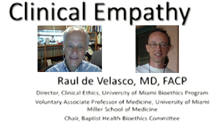 |
|
Raúl de Velasco is director of Clinical Ethics at the
University of Miami
Bioethics Program and Chair of the Baptist Health
Bioethics Committee. He says. "I am a physician who
practiced Nephrology for over 30 years and had a very large practice.
Most of my patients were on dialysis and needed kidney
transplants, they had a lot of problems, you learn how to detach from their
suffering but as I did that almost as a survival mechanism the practice of
medicine became less enjoyable more about numbers than of people."
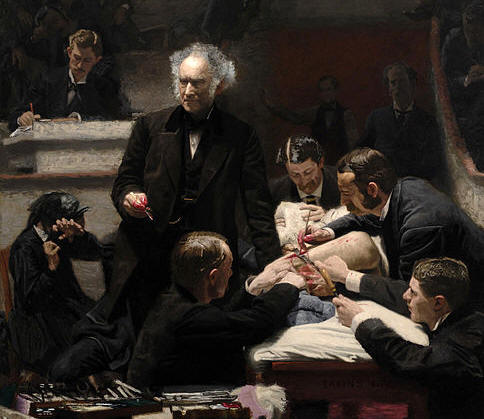
The
Gross Clinic - Thomas Eakins (Wikipedia)
Raúl saw the importance of empathy for doctors
and has been
working to promote empathy
in the medical field.
Raúl saw the importance of empathy for doctors and has been
working to promote empathy in the medical field. We held two
interviews about his studies and work on empathy. In the second interview, Raúl walked thought his Clinical Empathy Slide Show Presentation.
The presentation discusses;
1. Psychology of Empathy
2. Objectification and the ‘wiring’
3. Caring in Medicine
4. The Practice of Empathy
5. Problems with Empathy
Sub Conference:
Health Care
|
|
|
|
|
|
Got Empathy? The
Foundations of Empathy
Thea Blair
|
|
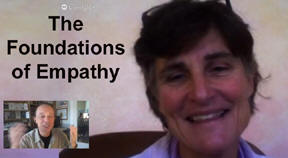 |
|
Thea Blair is a Waldorf teacher, and a Pediatric Massage
Therapist. She operated a successful, Waldorf-inspired pre-school out of
her home for fourteen years. Observing the amazing results of touch, either
playful or comforting, in resolving children's emotional stress led her to
seek a massage training. She now works as a parent and teacher coach, and a
touch educator.
Thea brings Peer Massage to schools as a consultant. She is
available for talks and workshops about touch, parenting, and childhood
development.
In this dialogue we discussed her empathy research and insights.
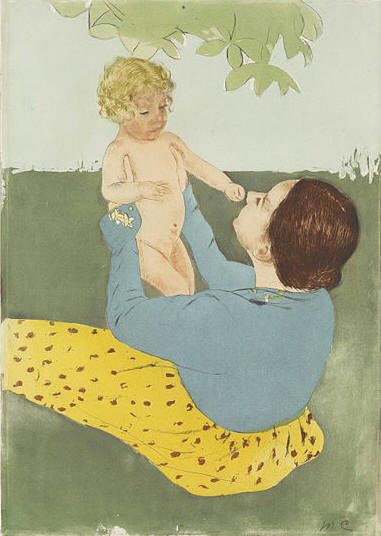
Under the Horse-Chestnut Tree
- Mary Cassatt
(Wikipedia)
The
ability to empathize develops with contributions from
various
biologically and environmentally based factors.
These factors include genetics, child temperament,
parenting factors such as warmth, parent-child
synchrony...
Thea wrote a
research paper on empathy: "The
Role of Motor Development in the Development of Empathy" and holds "The
Foundations of Empathy" presentations on empathy as well. She writes:
"The ability to empathize develops with contributions from various
biologically and environmentally based factors. These factors include
genetics, child temperament, parenting factors such as warmth,
parent-child synchrony, and other qualities of the parent child
relationship, and physical imitation such as facial mimicry and motor
imitation, using areas of the brain such as the mirror neuron system and
the limbic system. In this paper I will explore how motor development
supports the development of empathic awareness."
Sub
Conference: Education
|
|
|
|
|
|
Dialogs on How to
Build a Culture of Empathy
Lou Agosta
|
|
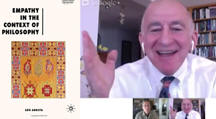 |
|
Lou Agosta is on the faculty of the
Illinois School of Professional Psychology. He practices
psychotherapy in the Chicago. His area of concentration includes
the dynamic containing and transforming of domestic violence and
intimate partner abuse.
Lou is author of
Empathy
in the Context of Philosophy which is an exploration of the
deep structure of empathy as a fundamentally human capability
for creating possibilities of community and human relations.
He also writes extensively about the
nature of empathy on his website
ListeningWithEmpathy.com.
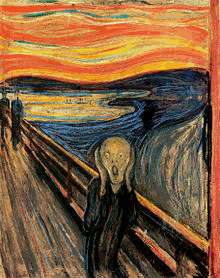
The Scream
- Edvard Munch
(Wikipedia)
if one is overwhelmed by the other’s trauma
and
re-traumatized, one is not using one’s
empathy properly. Simply stated,
you are doing it wrong. "
"The short definition of empathy is that it
is the capacity to know what an other individual is experiencing
because (speaking in the first person for emphasis) I experience
it too, not as a merger but as a trace affect or experience that
samples the other’s experience. Thus, if one is overwhelmed by
the other’s trauma and re-traumatized, one is not using one’s
empathy properly. Simply stated, you are doing it wrong. "
Sub
Conference: Science |
|
|
|
|
|
Dialogs on How to Build a Culture
of Empathy and Resilience
Robert Brooks
|
|
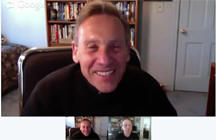 |
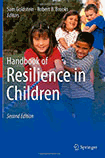 |
|
Robert
Brooks is one of today's leading speakers on the themes of
resilience, motivation, and family relationships. During the
past 30 years, Dr. Brooks has presented nationally and
internationally to thousands of parents, educators, mental
health professionals, and business people with a message based
on encouragement, hope, and resilience. He is on the faculty of
Harvard Medical School.
He is
author or co-author of 15 books including:
Handbook
of Resilience
and has written numerous articles about empathy.
He writes, "In my workshops and writings I
have consistently emphasized the importance of empathy as an
essential skill for enriching our lives... If empathy is not
translated into behavior it will indeed be a "sideshow."
However, when empathy serves as a guiding light for our
behaviors, showing us the path that leads to compassion and
caring, it becomes a potent force that will improve the lives
not only of our children but ourselves as well. The more we
bring together theory, skills, and actions, the more we can
engage in activities that permit us to lead purposeful,
fulfilling, caring lives.."
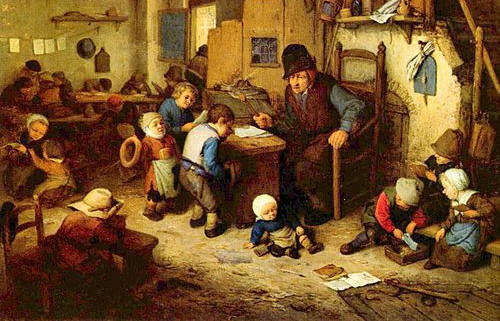
The Schoolmaster
- Adriaen van Ostade (Wikipedia)
a common
characteristic of individuals who are successful
as business leaders, teachers, parents,
spouses, or healthcare professionals
is their ability to be empathic.
"a common
characteristic of individuals who are successful as business
leaders, teachers, parents, spouses, or healthcare professionals
is their ability to be empathic. Empathic people are skilled in
placing themselves inside the shoes of another person and seeing
the world through that person’s eyes.
It is not surprising that
Daniel Goleman listed empathy as one of the main components of
emotional intelligence. In my activities as a therapist and
consultant as well as in my personal life, I have come to
believe that empathy is implicated in all of our relationships,
impacting on the satisfaction and effectiveness with which we
interact with others."
Sub Conference: Home & Family
|
|
|
|
|
|
How to Build a Culture of Empathy in Health Care
Helen
Riess |
|
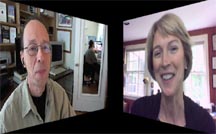 |
|
Helen Riess, M.D. is Associate Clinical Professor of
Psychiatry,
Harvard Medical School and Director of the Empathy and Relational Science
Program at Massachusetts General Hospital.
The mission of the Program is to enhance empathy and
interpersonal relationships in healthcare. She is also Chief Technology
Officer of
Empathetics
which offers scientifically based empathy training proven to optimize
interpersonal engagement.Helen is a coauthor of the study, Empathy Training for Resident
Physicians. The study concluded;
"A brief intervention grounded in the neurobiology of empathy
significantly improved the physician empathy as rated by patients,
suggesting that the quality of care in medicine could be improved by
integrating the neuroscience of empathy into the medical education."
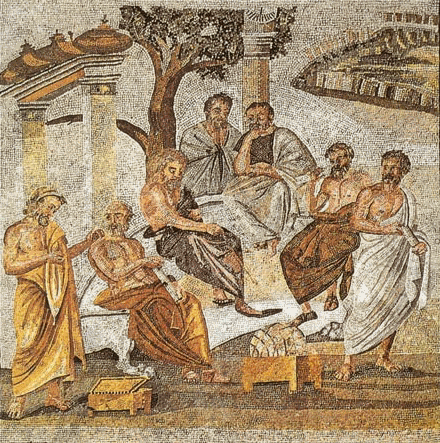
Plato's Academy mosaic from Pompeii
(Wikipedia)
Empathy is like "getting underneath the skin of another person,
to merge temporarily with their experience, then getting out,
to reflect on the experience. Empathy can be taught,
although a certain endowment may be inborn ..
Empathy is like "getting underneath the skin of
another person, to merge temporarily with their experience, then getting
out, to reflect on the experience. Empathy can be taught, although
a certain endowment may be inborn, research shows that it is a mutable
trait. Our study demonstrated that empathy could be increased
significantly in the training group and it decreased significantly in
the control group.
Sub Conference: Health Care
|
|
|
|
|
|
How to Build a Culture of Empathy
Scott Churchill
|
|
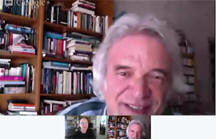 |
|
Scott D. Churchill is Professor of Psychology at
the University of Dallas and Editor of The Humanistic
Psychologist. His work focuses on development of
phenomenological and hermeneutic methodologies. Currently he is
studying interspecies communication with Bonoboos. Scott wrote
the article,
Encountering the Animal Other: Reflections on Moments of
Empathic Seeing. He
writes, "Unfortunately, there have not been many psychologists
willing to entertain the notion of empathy or intuition as a
reliable or even valid mode of access to psychological life of
others."
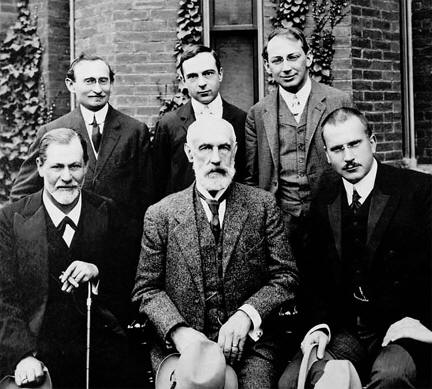
Hall, Freud, Jung, Clark (Wikipedia)
Unfortunately, there have not
been many psychologists
willing to entertain the notion of empathy or intuition
as a reliable or even valid mode of access
to psychological life of others.
In this article Scott explores the first person
(self-centered), third person (detached omnipotent) and empathic
second person perspective. "As a whole, the field of psychology
has generally provided for the first person perspective to be
legitimate means of access only to one's own private experience,
while insisting that we must observe all others' experience from
a neutral "third person" perspective."
Sub
Conference: Science |
|
|
|
|
|
How to Build a Culture of
Empathy in Pakistan
Maryam Sakeenah
|
|
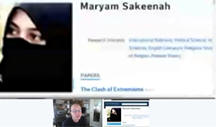 |
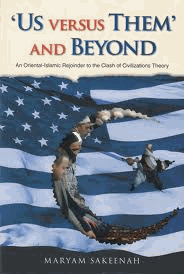 |
|
Maryam
Sakeenah is a social worker, teacher, and freelance writer
living in Lahore, Pakistan. She teaches Literature,
Islamic Studies and Sociology.
She is
leading a project for virtual education for underprivileged
school children.
Maryam also authored a book
documenting Islamic and Oriental responses to the Clash of
Civilizations, titled
Us
Versus Them and Beyond: An Oriental-Islamic Rejoinder to the
Clash of Civilizations Theory.
I talked with Maryam from her home in Lahore,
Pakistan about her article,
The Murder of Human
Empathy. This was her
response to the recent attacks on Christian homes in Lahore. She
writes,
"Empathy is curbed and limited through narrow,
parochial banners of ethnicity, nationalism, race and creed so
that the empathic drive does not extend to the out-group. The
out-group is then ‘otherised’. However, a more severe form of
this is dehumanization of the other, often institutionalized by
the social superstructure: state, media, education, religion."
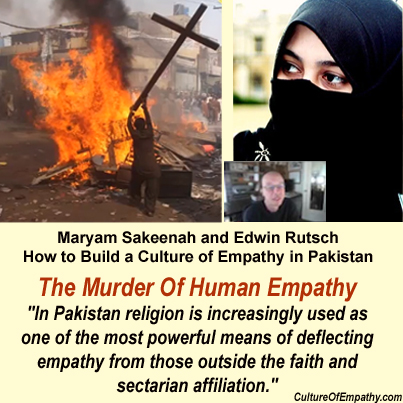
Empathy is curbed and limited through narrow,
parochial banners
of ethnicity, nationalism, race and creed so that the
empathic drive does not extend to the out-group.
She calls for leaders (especially religious
leaders) in Pakistan to stand up
and advocate for fostering empathy for all people.
"Empathy humanizes and civilizes. Its suppression
intensifies secondary drives like narcissism, materialism,
violence and aggression. The task of religion, education and the
media must be to bring out the empathic sociability stretching
out to all of humanity..."
Sub
Conferences:
Education
|
|
|
|
|
|
How to Build a Culture of
Empathy in Pakistan
Aurangzeb Haneef
|
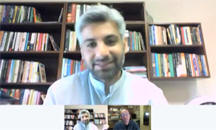 |
|
Aurangzeb Haneef is a religious scholar and teacher in the
Department of Humanities & Social Sciences, Lahore University
of Management Sciences in Pakistan. He completed a
Masters of Theological Studies at Harvard University. Earlier,
at two universities in Austria and Spain he completed an
International Master in Peace, Conflict and Development
Studies with a focus on Religion/Islam and Peace building.
Aurangzeb sees empathy as being central to the peace
building
process and he works to create dialog between the
different social factions in his classes.
In this dialog and interview, we talked about
the role of empathy as being foundational to peace building.
In Pakistan there is great polarization between the
conservative and liberal social factions and they are not
talking to each other with empathy. Aurangzeb sees empathy as
being central to the peace building process and he works
to create dialog between the different social factions in his
classes.
Sub
Conference: Science
|
|
|
|
|
|
Fear,
Creativity and Empathy
Anne Paris, Marian Brickner, Edwin Rutsch
|
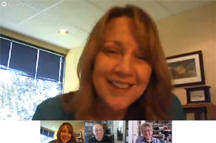 |
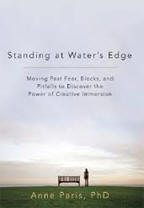 |
Anne Paris, PhD, author of
Standing at Water's Edge:
Moving Past Fear, Blocks, and Pitfalls to Discover the Power of Creative
Immersion, is a clinical psychologist in private
practice in Cincinnati, Ohio. She has practiced psychotherapy for over 25
years, and has specialized in working with artists, trauma victims,
couples, and parents. |
|
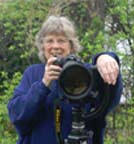 |
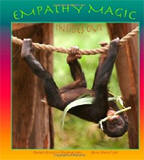 |
Marian
Brickner is an Animal Photographer. "Marian has a rare gift, which
takes remarkable skills of empathy, communication and visual art along with
a high level of technique." |
|
In this discussion we talked about the relationship of Fear,
Creativity and Empathy. Anne writes, "My ultimate goal is to help you
increase your self-empathy and stir you curiosity about how artistic blocks
are understandable and reasonable responses to your past experiences, your
present fears and your assumptions about your future...
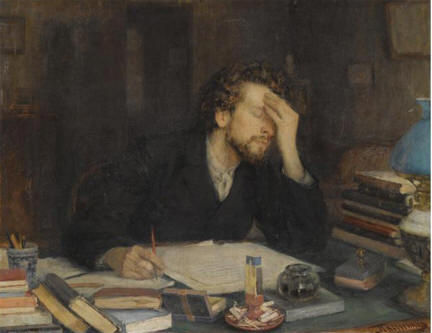
Leonid Pasternak (Wikipedia)
I believe one of your major tasks in
moving through the
creative processis finding a way to be more empathic
with your own experience.
Through
empathic encounters, immersive connections can ultimately diminish feelings
of aloneness while strengthening the persons core... I believe one of your
major tasks in moving through the creative process is finding a way to be
more empathic with your own experience. "
Sub Conference:
Arts |
|
|
|
|
|
Dialogs on How to Build a Culture of Empathy
Roman Krznaric |
|
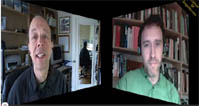 |
|
 |
|
Author:
The Wonderbox: Curious Histories of How to Live
I believe that empathy – the imaginative act of stepping into
another person’s shoes and viewing the world from their
perspective – is a radical tool for social change and should be a
guiding light for the art of living. As I describe in this video
definition of empathy, it matters not just because it makes you
good, but because it is good for you . |
|
|
|
|
|
Dialogs on How to Build a Culture of Empathy & Compassion
Emma Seppala
|
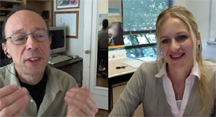 |
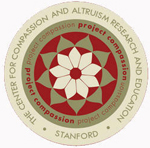 |
|
Emma Seppala originates from Paris, France and is Associate
Director at the Center for Compassion and Altruism Research and Education
(CCARE) at Stanford University. She is an Honorary Fellow at the Center
for Investigating Healthy Minds in Madison, Wisconsin.
Her research areas include: Complementary & Alternative Interventions
(yoga, meditation); The Science of Happiness, Health, Well-Being;
Stress; Trauma; Emotion and Emotion Regulation; Compassion, Social
Connectedness; Cross-Cultural Psychology.
Sub Conference:
Science
|
|
|
|
|
|
Dialogs on
How to Build a Culture of Empathy
Maia Szalavitz |
|
 |
|
 |
|
Maia Szalavitz is a
writer and co-author of
Coauthor: Born for Love: Wh Empathy Is
Essential and Endangered
Empathy - fully expressed in a community of nurturing
interdependent people - promotes health, creativity, intelligence,
and productivity. In contrast, apathy and lack of empathy
contribute to individual and societal dysfunction, inhumane
ideologies, and often brutal actions.
Sub
Conference: Science |
| |
| |
|
On Empathy
Rick Hanson |
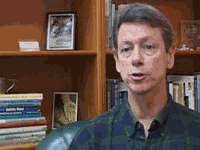 |
|
 |
I
have a special interest, a particular interest in practical
methods, useful things, found at the intersection of
psychology, brain science and contemplative practice... I
think looking out at the world today, we have a crises of
empathy in a way.
Sub
Conference: Science |
|
|
|
|
|
Dialogs on How to Build a Culture of Empathy in Education
Bob
Sornson
|
|
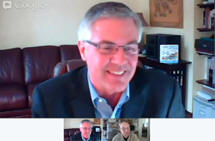 |
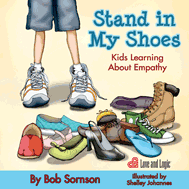 |
|
Bob Sornson was a classroom teacher and school
administrator for over 30 years, and is the founder of the
Early Learning
Foundation. He works with schools and
education organizations across the country,
focusing primarily on developing
comprehensive programs which support early learning success,
building classroom and school culture to
support the development of social and behavior skills, and offering parent
training.
Bob is the author of a number of books including:
Stand in My Shoes: Kids Learning About Empathy. "When Emily asks
her big sister what the word empathy means, Emily has no idea that knowing
the answer will change how she looks at people... Empathy is the
ability to notice what other people feel. Empathy leads to the social
skills and personal relationships which make our lives rich and beautiful,
and it is something we can help our children learn. This book teaches
young children the value of noticing how other people feel. Were hoping
that many parents read it along with their children."
Sub
Conferences:
Education |
|
|
|
|
|
How to Build a Culture
of Empathy & Peace
James O'Dea
|
|
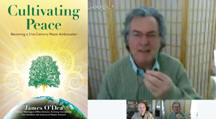 |
|
James O’Dea is the lead faculty for the Shift
Network’s Peace Ambassador Training with hundreds of international
participants. These trainings are ongoing.
He is on the extended faculty of the Institute
of Noetic Sciences and its former President.
James
is author of,
Cultivating Peace: Becoming a 21st Century Peace Ambassador.
"When we can really put ourselves in the shoes of the
other, when we can reach new depths of empathy, then we can be effective
ambassadors of peace....

The
Peaceable Kingdom
-
Edward Hicks (Wikipedia)
When we can really put ourselves in the shoes of the
other,
when we can reach new depths of empathy,
then we can be effective
ambassadors of peace....
Without empathy there is no way forward for civilization.
Without empathy there is no way forward for
civilization. Individuals who lack empathy are trapped in selfish
motivations and ego fixations: they have not learned how to see themselves
in the predicament of others. Politicians who lack empathy relate to
others through a primitive in-group inclusion or out-group exclusion. This
degree of psychological development cannot negotiate any form of middle
ground. Conviction is reduced to simplistic binary codes such as "You are
either with us or against us.""
Sub Conference: Peace & Empathy |
|
|
|
|
|
How to Build a Culture of Empathy with Social Work
Louise Grant
|
|
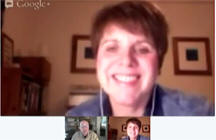 |
|
Louise Grant
is Senior Lecturer in Social Work at the University of
Bedfordshire. Louise has been studying the role of empathy in fostering
resilience in social workers in the UK.
She says, "My teaching interests are in children and families social work
and in particular in developing reflective practice for effective social
work and developing supervision knowledge and skills in social workers. My
research focus is on reflective practice and developing emotional
resilience for social work practice"
Louise is co-author of the
study,
'Exploring
Stress Resilience in Trainee Social Workers: The Role of Emotional and
Social Competencies'.
In order to inform the development of interventions to enhance the
work-related well-being of early career social workers, this study examined
several emotional and social competencies (i.e. emotional intelligence,
reflective ability, empathy and social competence) as predictors of
resilience in 240 trainees.
Sub Conferences: Health Care
and
Science |
|
|
|
|
|
How to Build a Culture of Empathy with Acting and Imagination
Diana Castle
|
|
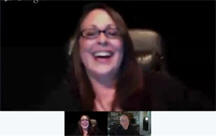
|
|
Diana Castle is a first generation American born of a
holocaust survivor. She attended a fine arts high school before graduating
with a BFA in theatre with a music minor. She began her career in both
musicals and dramatic roles in NYC, in national tours and regional theatre,
as well as on stages internationally.
"Diana Castle’s THE IMAGINED LIFE™ – Acting As The Art of The Empathetic
Imagination- is a creative philosophy and practical application of your
natural empathetic imagination to the art of acting...
Diana works with actors, singers, writers and directors of
diverse backgrounds from all over the world in an effort to illuminate an
experience of alternative perspectives, facilitate catharsis and create
community through her creative philosophy and the empathetic imagined life
experience."
We had a fun, dynamic and almost 2 hour discussion about the
nature of empathy and how to embody it through acting. We explored how to
not just talk about empathy, but embody it.
Sub Conference: Arts |
| |
| |
|
Panel
21: Philosophy and Empathy |
|
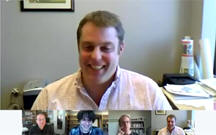 |
|
Anthony I. Jack
Joshua Knobe
Philip Robbins
Edwin Rutsch |
|
|
This panel brings together three leading
researchers in the emerging field of experimental philosophy: a
field which uses the experimental methods of the cognitive and
social sciences to shed light on philosophical problems. This is a
free ranging discussion of recent research and work in progress.
We discuss
how our conception of the minds of others relates to empathy of
various types, with a particular focus on empathy in the sense of
compassion. The discussion touches on dehumanization,
objectification, and how empathy relates to our tendency to see
minds as embodied, as able to feel different kinds of emotion, and
as possessing autonomy or free will.
Sub Conference:
Science |
|
|
|
|
|
How to Build a Culture of Empathy in Criminal Justice
System
Chad
Posick
|
|
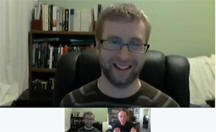 |
|
Chad Posick has a B.S. degree in criminal justice and an
M.S. degree in public policy from the Rochester Institute of Technology. He
just finished his Ph.D in criminal justice from Northeastern University in
Boston, Massachusetts. He has worked with Project Safe Neighborhoods in the
Western District of New York as well as the Department of Criminal Justice
Service’s Project Impact. His research areas include restorative justice,
cognitive behavioral interventions and action research.
We talked about
Chad's research and study:
More Than a Feeling: Integrating Empathy Into the Study of Lawmaking,
Lawbreaking, and Reactions to Lawbreaking. "Empathy
is related, directly or indirectly, to important elements in criminology
such as the enactment of harsh penalties for repeat offenders, antisocial
behavior, feelings of legitimacy toward the law, and attitudes toward the
death penalty. Although empathy is beginning to find its way into
criminological discourse, it is still not well understood nor often
incorporated into quantitative research. "
Sub Conferences:
Science and
Justice |
|
|
|
|
|
How to Build a Culture of Empathy with Reflective
Listening
Maria Seehausen |
|
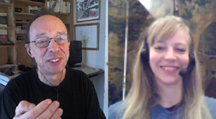 |
|
Maria Seehausen is a psychologist
and neuroscientist at the Cluster of Excellence: Languages of Emotion of
the Free University Berlin, where she works on her dissertation on the
effects of empathic paraphrasing on emotion in social conflict. She also
works as a freelance
mediator, trainer and coach, and is interested in the scientific
exploration of intervention techniques used in conflict resolution. Maria
is lead on the study, 'Effects
of empathic paraphrasing - Extrinsic emotion regulation in
social conflict'.
"In
the present study, we investigated the effects of empathic paraphrasing as
an extrinsic emotion regulation technique in social conflict. We
hypothesized that negative emotions elicited by social conflict can be
regulated extrinsically in a conversation by a listener following the
narrator’s perspective and verbally expressing cognitive empathy.
20 participants were interviewed on an ongoing or recently
self-experienced social conflict... it is possible that empathic
paraphrasing not only leads to a reduction of negative emotion in
participants, but even induces positive emotions, such as happiness and
relief about being listened to and validated.'
Sub
Conference: Science and
Justice
|
|
|
|
|
|
How to Build a Culture of Empathy with Archaeology
Penny
Spikins
|
|
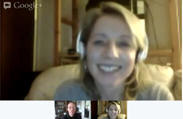 |
|
Penny
Spikins
is Senior Lecturer in the Archaeology of Human Origins in the
Department of Archaeology,
University of York. One of her
main areas of research is on the archaeological evidence for the evolution
of empathy and compassion. "My early research centred on Mesolithic
northern England where I retain an interest and enthusiasm, although I'm
best known for my later research into the emergence of autism and the
evolution of empathising and compassion in the Palaeolithic."
Penny
is writing a book titled, 'How Compassion Made Us Human: An archaeology of
prehistoric sentiment'
We discussed;
- why it is important that compassion was key to our
evolutionary history.
- how archaeological evidence can tell us about how
compassion evolved.
- how a capacity to put others first in modern
hunter-gatherers works to help them survive, not just as a group but as
individual (which helps us understand the evolutionary pressures in the
stone age).
- the building blocks of capacities to put others first
in apes, and how humans take those capacities to another level.
Sub Conference:
Science
|
|
|
|
|
|
Panel 20: Empathy in Critical Care - Empathy and Healthcare
Conference |
|
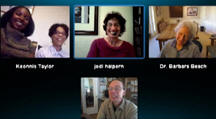 |
Keonnis R. Taylor
Jodi Halpern
Barbara Beach
Marilyn Ababio
Edwin Rutsch |
|
|
This panel with experts in the field of healthcare
explored the role of empathy and compassion in providing medical care.
A few of the questions addressed were;
- How do those providing objective medical
care, especially around the grim subject of one's own death,
provide compassionate care without absorbing the emotions
surrounding imminent death?
- Please describe your work and why the
principle of empathy is relevant to it?
- The theory of Counter-Transference in
Psychology postulates that the practitioner's feelings are
entangled with the patient's. Does this also happen in the
medical field? etc.
Sub Conference: Health Care
|
|
|
|
|
|
Dialogs on How to Build a Culture of Empathy
Anthony Jack
|
|
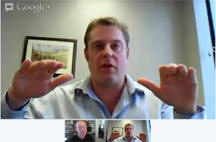
|
|
Anthony Jack, PhD (Tony) is Assistant Professor of Cognitive
Science, Philosophy, and Psychology in the Brain, Mind and Consciousness
laboratory in the Department of Cognitive Science at Case Western Reserve
University, Cleveland, Ohio.
He says, "I have a PhD in Experimental Psychology and extensive training in
Philosophy and Neuroscience. I started out doing largely theoretical work
on consciousness, but then got interested by the emerging field of brain
imaging. I use fMRI to study attention, consciousness and social processing
in the brain."
Tony has been studying empathy and was involved in a study
that looks at the analytic and empathic neural networks and how they
relate to each other. This article 'Empathy
represses analytic thought, and vice versa' on Science Blog says,
"When the brain fires up the
network of neurons that allows us to empathize, it suppresses the network
used for analysis, a pivotal study led by a Case Western Reserve
University researcher shows... At rest, our brains cycle between the
social and analytical networks. But when presented with a task, healthy
adults engage the appropriate neural pathway, the researchers found.
The study shows for the first time that we have a built-in
neural constraint on our ability to be both empathetic and analytic at the
same time."
Sub Conference:
Science: Neuroscience
|
|
|
|
|
|
Restorative Empathy Circle 1 with Democrats and Republicans
|
|
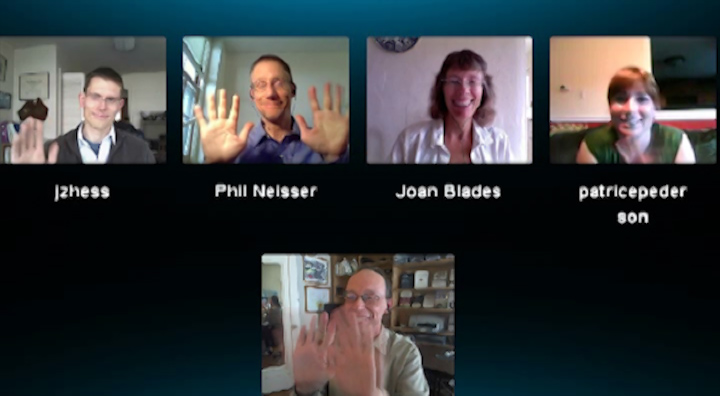 |
|
We hold Restorative Empathy Circles for individuals and groups that are
in conflict. These groups can support a wide variety of conflicts.
Restorative Empathy Circles with Democrats and Republicans bring the
different political parties and political movements together.
This was our first
Restorative
Empathy Circle.
We asked; what is your most important value
and how did it become important to you, how does your value relate to
empathy and how can we foster empathic connection and understanding across
political lines?
There seemed to be a consensus about the importance of
fostering empathy and compassion in society. We learned a lot about
refining and developing the circle process for the next time.
Unfortunately we had a bit of computer technical problems with Skype,
audio, etc.
Participants were;
|
|
|
|
Four Week Series:
Pattie Porter Interviews Edwin Rutsch
2. Empathy – How Do We Build It?
-
Listen to Podcast -
See Video
|
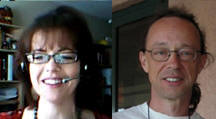 |
|
In our
second episode of the series Conflict and Empathy: Where Has
Empathy and Compassion Gone?, Edwin Rutsch and I will discuss
how do we build empathy and compassion? Edwin will discuss a
number of strategies he has implemented at the Center for
Building a Culture of Empathy. One strategy has been the use of
Empathy Circles using empathic reflective listening with
individuals and groups. He will share real life examples and
will model the skill. |
|
|
|
Four Week Series: Pattie Porter (The Texas Conflict Coach)
Interviews Edwin Rutsch
1. What Does Empathy Got To Do With It?
-
Listen to Podcast
|
 |
|
For
many of us engaged in conflict or embroiled in a dispute, it can
be very difficult to muster up empathy and compassion for the
other side. The longer the conflict goes unresolved it seems
the less empathy we have for them as a human being. In this first
of our four episode series–Conflict and Empathy: Where Has Empathy
and Compassion Gone?– we will introduce the “wheel of empathy” and
the “feel of empathy” as |
|
defined by Edwin Rutsch,
Founder of a global empathy movement called The Center for
Building a Culture of Empathy. We will also discuss how
compassion intertwines with empathy and set the foundation for how
you build empathy.
Questions
-
Let’s start by sharing with listeners
about how you got started in this work of building a culture of
empathy and creating the Center.
-
Given that this is the first episode in our
series Conflict and Empathy, let’s set the stage and define some
of these concepts.
-
What exactly is empathy and the intention
behind it?
-
How is empathy different from sympathy?
-
How does compassion intertwine with empathy?
-
We said that we would introduce two concepts…the
“wheel of empathy” and the “feel of empathy.” What is important
to know about these concepts?
How do these wheels
tie into the Empathy Circles you host through Google Hangouts?
Sub Conference: Justice |
|
|
|
|
|
How to Build a Culture of Empathy in Healthcare
Dorrie Fontaine
|
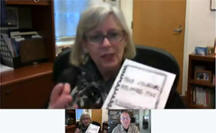 |
|
Dorrie Fontaine, is
Dean of the School of Nursing at the University of Virginia. At the school
she started the Compassionate Care & Empathic Leadership Initiative (CCELI)
"which exists to create dialogue around and preparedness for nurses who
deal every day with people in life-changing situations–one-time or chronic
illness, terminal disease, end-of-life care and even death itself–and all
the highly-charged, complex issues surrounding them. |
|
The
CCELI focuses on systems that optimize patients’ and their family’s
quality of life, incorporate compassion and empathy into personal
behavior, interprofessional interactions and encounters with patients and
families. We’re developing clinical, educational and research
initiatives that further those aims. Our ultimate vision is to reduce
human suffering and promote health and well-being by fostering
compassionate people and systems."
"Can compassion be taught? UVa Nursing's all volunteer army of nurses,
physicians, administrators, professors and students are learning concrete
ways to insert compassion into every patient interaction -- and they're
bolstering their own resilience in the process."
Sub Conferences: Health Care |
|
|
|
|
|
How to Build a Culture of Empathy
or Not
Mark Honigsbaum
|
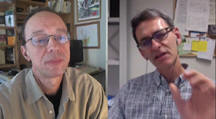 |
|
Mark Honigsbaum is a Research Associate at the University
of Zurich's Institute for Medical History and the author of 'Living
With Enza'.
Mark wrote some articles about the role empathy,
The
Politics of Empathy
and
Barack Obama and the 'empathy deficit' which was published in the
Guardian. We talked about his articles and views on the role of empathy in
society |
|
Mark said, "I'd be very happy to talk to you
about empathy just so long as you understand that I am primarily an
historian of medicine so, while I am all for promoting greater compassion
and awareness of the predicament of those less fortunate than myself, I am
wary of this notion of empathy as intrinsically pro-social and moral. This
strikes me as a very recent notion, traceable to the birth of the psy
sciences around the turn of the last century. Moreover,
if alleviating the suffering of the poor and disadvantaged is to be more
than a feel-good sound bite it has to be married with a real political
agenda, which means making choices and taking sides (in my opinion of
course)"
Sub
Conference: Journalism and Media |
|
|
|
|
|
Dialogs on How to Build a Culture of Empathy
Mark Rosenblum
|
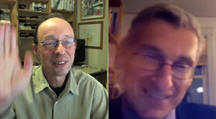 |
|
Mark Rosenblum is Professor of History and Director of
Center for Ethnic, Racial and Religious Understanding
(CERRU)
at
Queens College, New York.
CERRU inspires
a generation of leaders who value cross-cultural engagement, listening,
and empathy to inform positive social change. |
"Building
Empathy
- One of the goals of the program is to increase students’ ability to
understand and empathize with a wide range of experience and opinion.
During the dialogue sessions, our student facilitators lead groups of
students in discussion regarding contentious issues on campus and in
the community. Participants are encouraged to listen actively, and
without judgment, even if they do not agree."
Sub Conference:
Science
|
|
|
|
|
|
How to Build a Culture of Empathy with Compassion Focused Therapy (CFT)
Wendy Wood
|
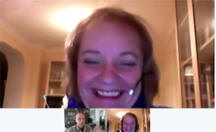 |
|
Wendy Wood is Senior Lecturer
at the Mental Health and Therapeutic Practice
Faculty of Education, Health and Sciences
at
University of Derby, UK.
Wendy is also Programme leader for the Compassion Focused Therapy programme.
"I worked within the NHS for 14 years as a Mental Health Nurse then as an
assistant psychologist and then as a counsellor in primary care. I also
worked for a year as a freelance trainer, therapist and clinical
supervisor." |
|
"Compassion
Focused
Therapy
is a psychological approach that was originally developed to
help people with high shame and self-criticism, and this course will
introduce you to the basic ideas and interventions that are used. This
course is for you if you are in a mental health profession, for example
psychiatry, psychology, nursing or occupational therapy and you are
trained to form and develop psychotherapeutic relationships.
Also, if you have basic counselling and
cognitive behavioural therapy skills and you would like to develop your
skills when working with clients who experience shame and self-criticism
thoughts, then this course is for you."
Sub Conference:
Science |
|
|
|
|
|
Dialogs on How to Build a Culture of Empathy
Walter Osika
|
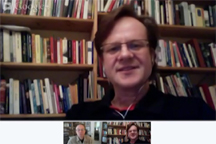 |
|
Walter Osika MD, PhD, works
as a stress researcher and his research profile is "neuropsychiatric and
cardiovascular measures in childhood and adulthood". He has primarily studied
self assessed psychological health and cardiovascular regulation in children.
He is also participating in epidemiological studies of early exposures and
later outcomes in terms of psychiatric and cardiovascular disease, as well as
in studies of burn out patients and of autonomic regulation in relation to
hearing and cognition."
|
|
|
|
|
|
Dialogs on How to Build a Culture of Empathy
Lidewij Niezink
|
|
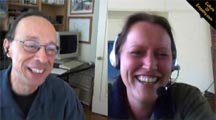 |
|
Lidewij
hosts the Empathy and Charter for Compassion groups on Linkedin.
Her Ph.D was in empathy and altruism. She is a strategic
advisor, trainer and innovator, and helps organizations, groups
and individuals to implement different aspects of empathic
concern into their professional as well as private lives.
How to build a culture of empathy?
Stop looking for the qualities of empathy and compassion outside
of ourselves. We ALL possess these qualities already (as
research is showing us). Develop and make use of the methods
offered to cultivate empathy and compassion within ourselves
according to what speaks to our individual minds and hearts...
Sub
Conference: Science |
|
|
|
|
|
How to Build a Culture of Empathy
Melanie Sears
|
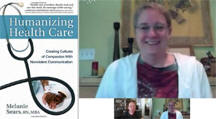 |
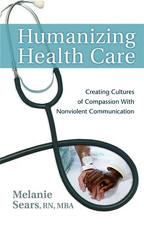 |
Melanie
Sears has been a trainer for the Center of Nonviolent
Communications since 1991. She works with businesses, hospitals,
nursing homes, hospices, individuals, couples and parents in
transforming their usual way of operations, interpersonal
interactions and dealing with conflict to one which is more
compassionate, conscious and effective. |
|
Melanie
presents Nonviolent Communication at conventions, at
universities, and at churches. She has been interviewed on
the radio and on TV and is the author of several books
including: Humanizing
Health Care with Nonviolent Communication.
Sub Conference:
NVC
and
Health Care |
|
|
|
|
|
Global Empathy Experiment - How to Build a Culture of Empathy
Gil Lavie
|
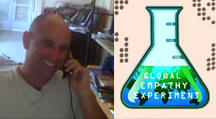 |
|
Gil Lavie is a Viral Advertising Expert and started the
Global Empathy Experiment (GlobalempathyExperiment.org)
in one of his classes at the the Interdisciplinary Center Herzliya,
Israel. He say, "I'm half art - half science. My interests are
memes, humor, empathy and other fascinating notions. I had a 10-year
career in hi-tech global marketing. Then I started one of the first viral
ad agencies in 2002, where I created over 50 viral video commercials that
organically reached out to hundreds of millions of viewers". |
"Globalizing empathy is a step towards a better society,
developing care and understanding that cross geographical, social and
species boundaries. Can us caring lead others to care? And can this care
be translated into actions? Actions like saving lives, spreading love,
reaching out and giving a helping hand… We are simply students creating
a platform for promoting Empathy by crowd-sourcing creativity & humor."
Sub
Conferences:
Education |
| |
| |
|
Panel 25:
Libertarian: How might we transform domination cultures
& systems
into empathic cultures? |
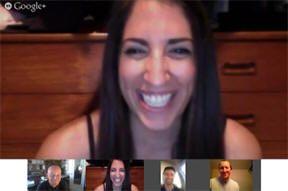 |
Panelists:
Wesley Bertrand
Katie Testa
Tom Garrett
Edwin Rutsch
|
Through a reflective listening and empathy process, we explored
some of the concerns about systems (organizations and institutions
with laws, rules, policies, procedures, and norms) that can
discourage empathy with self and with others. Domination systems
are based on hierarchies of authority and demanded compliance,
with punishments administered for noncompliance. |
|
In
turn, people tend to play roles and obey rules that deny personal choice
and self-responsibility, which diminishes human freedom. Perhaps anger,
fear, and distrust underlie such "power-over" practices, in which others
are not really seen as capable and willing to meet human needs--so they
must be forced to do so. We speculate that if empathy were focused on
and practiced in relation to systems of domination, helpful
transformations could take place.
Sub Conference:
Politics |
|
|
|
|
|
How to Build a Culture of Empathy
Wesley Bertrand and Edwin Rutsch
|
|
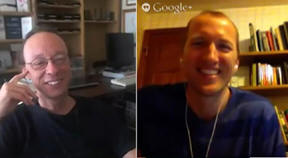 |
|
Wesley says, "From an early age I’ve been fascinated about how to
achieve a higher level of emotional awareness and personal evolution, and
thus life satisfaction. Psychology has been a passion of mine well before
receiving my Bachelor of Science degree in this field in ’97. I have a keen
interest in answers to the important questions about self, reality, and
others. Reading profound books such as Honoring the Self by self-esteem
psychologist Nathaniel Branden helped provide many of the missing pieces."
Psychology and Politics. |
|
|
|
|
|
How to Build a
Culture of Empathy?
Jason Marsh
|
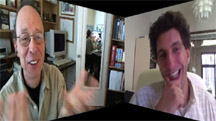 |
 |
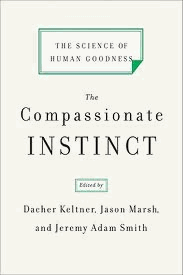 |
Jason Marsh is editor in chief of Greater Good magazine and
website at U.C. Berkeley. Jason is a graduate of the UC Berkeley
Graduate School of Journalism and
a
co-editor of,
The
Compassionate Instinct.
|
How to Build a Culture of Empathy?
First, promote personal contact across different groups.
Do this in places like the workplace, schools and so on. Second, encourage cross-group
contact and perspective taking among kids and in schools. Create a
curriculum of empathy within schools.
Third, inequality creates a negative spiral, it reduces empathy which
creates more inequality, which reduces empathy further, which creates
more inequality, etc. We need to create a positive spiral of more
empathy, more equality, more empathy, more equality.
Sub Conferences:
Science and
Journalism-Media.
|
|
|
|
|
|
How to Build a Culture of Empathy & Peace
Johan Galtung
|
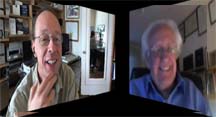 |
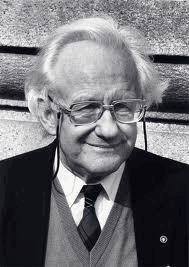 |
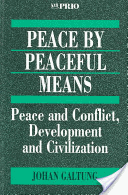 |
Johan Galtung is the principal founder of the discipline of
peace and conflict studies. He founded the Peace Research Institute Oslo in
1959 and is referred to as the "father of peace studies". |
Johan has also mediated in over 150 conflicts between states
and nations. He has published over 100 books, including 'Peace
by Peaceful Means: Peace and Conflict, Development and Civilization'
and "The
Fall of the U.S. Empire - And Then What?”
He co-founded TRANSCEND International which has as its
mission: "To bring about a more peaceful world by using action,
education/training, dissemination and research to transform conflicts
nonviolently, with empathy and creativity, for acceptable and
sustainable outcomes."
He has a quote which I find succinctly sums up the relationship between
empathy and peace.
“By peace we mean the capacity to transform conflicts
with empathy, without violence, and creatively — a never-ending
process”
Sub
Conference: Justice
|
|
|
|
|
|
Dialogs on How to Build a Culture of Empathy
Vivian Bohl |
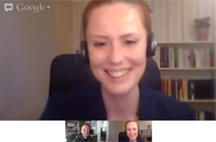 |
|
Vivian Bohl is an Estonian philosopher at Tartu University.
She is a PhD student and her doctoral work is in the field of social
cognition. We talked about the
definitions of Empathy. She
says, "Defining
empathy has always been a tricky issue and up to now, the conceptual
issues surrounding 'empathy' are causing more and more confusion in
scientific and philosophical literature. It's about time someone did
something to solve these complex conceptual issues. I see that in your
project, you are also interested in compassion. This is a very important
empathy-related topic, in my opinion. |
|
For me, the best definition of compassion is a Buddhist
definition: it is the wish to alleviate the suffering of others and to
eliminate the causes for suffering. Since I'm quite happy with that
definition, we could discuss what this definition exactly means and also
talk about how to become a more compassionate person."
Sub Conference:
Science
|
|
|
|
|
|
How to Build a Culture of Empathy
in Education
Bob Kane,
James D'Amanda
|
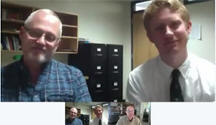 |
|
Bob Kane is Director of the Center for Mindfulness &
Empathy Education (CMEE) at The Harley School. Bob teaches Hospice
at The Harley School. As an end-of-life care educator and hospice nursing
assistant, he continues to mentor high school students to provide comfort
care to the dying and their loved ones James
D'Amanda is a Grant Writer and Event Manager at CMEE, as well as, a
freelance writer. |
The Center
for Mindfulness and Empathy Education
at the Harley School has the mission to
empower Nursery-12 teachers, students, staff and parents with the
requisite tools and support necessary to foster a sustained, compassionate
presence through the development and nurturing of programs that demand
authentic human engagement, stimulating our inborn capacity to
compassionately connect to and understand others, embracing their
situation as our own... The center evolved in response to the
increasing recognition that mindfulness and empathy play an indispensable
role in humanizing our educational systems... We don't have a
School uniform. But we do require you to walk in someone else's shoes.
Sub Conferences:
Education |
|
|
|
|
|
How to Build a Culture of Empathy
with Yoga
Julian Walker
|
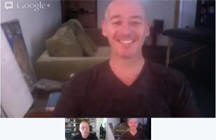 |
|
Julian has been teaching yoga since 1994 and practicing Mind-Body
Healing since 1997. His approach to yoga combines a 20 year fascination
with spirituality, science, psychology, music and poetry. He maintains a
busy bodywork practice and teaches ongoing classes, chakra-based
workshops and transformational retreats. He also writes and blogs on the
intersection of spiritually, science and psychology.
In this discussion, we explored how yoga can foster empathy.
Sub Conference: Yoga |
|
|
|
|
|
|
|
Dialogs on How to Build a Culture of Empathy
Ian Reifowitz
|
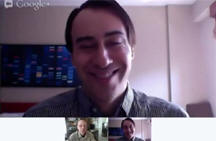 |
 |
Ian Reifowitz teaches history at Empire State College of the
State University of New York. He is the author
of,
Obama's America: A
Transformative Vision of Our National Identity.
In his article,
Obama Calls for Empathy in Israel, Ian writes,
"President Obama gave an
absolutely terrific speech yesterday in Israel. |
The
key section of the speech occurred when the president declared that
Israelis need to truly understand how Palestinians see the conflict
differently than they do. Obama urged them to "put yourself in their
shoes. Look at the world through their eyes... In this piece, I want to
point out that this concept of putting oneself in the shoes of one's
opponent or even just someone different from oneself, i.e., empathy, is at
the heart of Obama's entire worldview...
He has drawn on the idea of empathy repeatedly as part of his push to
encourage and invigorate ties across lines of race, culture, religion,
region, etc. in this country. As I've written in my book Obama's
America: A Transformative Vision of Our National Identity, empathy is
thus central to his call to strengthen our sense of being one American
people. In The Audacity of Hope Obama spoke of empathy
as being "at the heart of my moral code" and defined it as "a call to
stand in somebody else's shoes and see through their eyes."
Sub Conference:
Science |
| |
| |
|
Panel 23 - The Role of Empathy in Crime,
Policing and Justice |
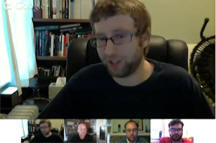 |
Chad Posick
Joe
Brummer
Michael Rocque
Edwin Rutsch |
The role
of empathy in policing, both empathy for and by the police, is
gaining attention from criminal justice researchers and
practitioners. While research on the effectiveness and importance
of empathy in policing is limited, the existing research indicates
that empathy increases perceptions of legitimacy and trust in the
police. |
This panel discusses a range of issues related to
the role of empathy in criminal behavior, punishment, and policing
with a specific emphasis on training police on how to incorporate
empathy into their work.
Sub
Conference: Justice |
|
|
|
How to Build a
Culture of Empathy in Healthcare
Richard Levin
|
 |
|
Richard Levin is an internationally recognized physician
scientist, scholar, cardiologist and educator. He is also the President
and CEO of the Arnold P. Gold
Foundation. The Gold Foundation is a not-for-profit organization
dedicated to fostering humanism in medicine. "It encourages the
development of physicians who combine the high tech skills of cutting-edge
medical science with the high touch skills of communication, empathy and
compassion." |
The organization says that, "As the nature of
doctor-patient relationship changes, compassion and empathy are
essential." The Foundation fosters the development of empathy in
healthcare thought a variety of ways and initiatives, such as,
lectures, conferences, physician networking, grants, fostering
scientific research, award ceremonies, a website, etc.
Sub Conference: Health Care
|
|
|
|
|
|
How to Build a Culture of Empathy & Compassion
Marc Brackett
|
|
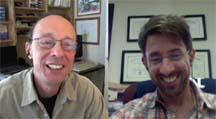 |
|
Marc Brackett is a Research Scientist in the Department of
Psychology at Yale University. He also is Deputy Director of Yale's Health,
Emotion and Behavior Laboratory and Head of the Emotional Intelligence Unit
in the Edward Zigler Center in Child Development and Social Policy.
He is the lead developer of The RULER Approach to Social and Emotional
Learning, an evidence-based social and emotional learning (SEL) program
that currently is implemented in hundreds of schools throughout the United
States and abroad. The acronym RULER refers to the five key emotion skills
of Recognizing, Understanding, Labeling, Expressing, and Regulating
emotions. Marc says authenticity is his most important value.
Sub Conference:
Science |
|
|
|
|
|
How to Build a Culture of Empathy with Movies
Alex Gabbay
|
|
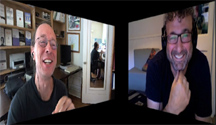 |
|
Alex Gabbay is a Filmmaker and Director.
His documentary,
'Love
Hate and Everything in Between' is about empathy and looks
into the world of neuroscience, psychology, education and technology to
explore the extraordinary relevance of empathy in today’s increasingly
interconnected world.
Man’s capacity for kindness and compassion is overshadowed
only by his ability to be as cruel and destructive. Can empathy resolve
issues of aggression and subjugation, where wars, politics and economic
sanctions have failed?
Guernica
by Pablo Picasso
(Wikipedia)
Can empathy resolve issues of aggression and
subjugation, where wars, politics and
economic sanctions have failed?
Empathy – a
subject increasingly tested by world events and studied by scholars –
is put under the microscope in this documentary. Alex and Edwin have a
wide ranging discussion about the nature of empathy and his
suggestions for building a culture of empathy.
Sub Conference: Arts |
|
|